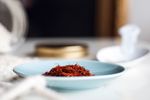
Lia Avellino, LCSW
Advisor of Head and Heart at THE WELL
Updated: 08/18/2022
Intuitive eating can be an incredibly powerful practice for finding peace with both food and your body. But before I share more about eating intuitively, first let’s discuss why it can be so hard. To start, it can be helpful to ask yourself: “What is the story I tell myself about my body? How did this narrative come to be? Who are the contributors and scriptors?”
I’ll go first, because I want to be transparent about aspects of culture that have influenced my experiences and understanding. I am a white, cisgendered woman with a history of anorexia nervosa. I grew up in a working class Italian-American home in New York City. My father was a restaurant manager who showed love through food-sharing and my mother struggled with disordered eating. I attended birthday parties where girls encouraged me to weigh myself and I lied about the number I saw. I grew up wanting to be nice, kind and good. Some of the intergenerational shadows that were passed down to me and my body included restrictive eating, deprivation of emotional needs in service of others and sexual trauma.
Professionally, I am a Columbia University-trained feminist psychotherapist. In the battle with a culture that rewards tuning out of the body, I’ve been uplifted by others in order to be able to support women (a.k.a. anyone who identifies as a woman and has been harmed by the patriarchy).
RELATED: All About Mindful Eating
Effects of “Diet Culture”
From a very young age, many women are taught to distrust their bodies, relating to them as rebellious and disobedient. We receive messages about what makes us valuable to our families, our communities or dominant white culture, rather than asked about what we value and what we want for ourselves. We are encouraged to follow external rules about taking up space. Some of us are rewarded for staying small and obedient.
In the common phrase “she let herself go,” I hear the voice of a white male power that tells us it is unforgivable to step outside of the narrow mold that was created for us — that to be expansive is a bad thing instead of a liberatory practice. Diets, related to food as well as those that discourage feeling, are about following the rules and listening to extrinsic guidance about what is right and wrong, instead of honoring the voice within us who knows what we need to be well.
In The Body is Not an Apology, Sonya Renee Taylor tells us: “Living in a female body, a Black body, an aging body, a fat body, a body with mental illness is to awaken daily to a planet that expects a certain set of apologies to already live on our tongues. There is a level of ‘not enough’ or ‘too much’ sewn into these strands of difference.”
"We begin to participate in a system of judgment that equates the appearance of the body with metrics of enoughness."
As a result, we begin to participate in a system of judgment that equates the appearance of the body with metrics of enoughness. We learn to deny what makes us feel good, what brings us lasting pleasure and nourishment, possibly in part because taking in too much means something negative about us. (For example: Do I deserve this goodness? Am I too hungry? Are my desires too big?). We learn to wire systems of rewards and punishment to food, hearing a critical voice when we imbibe what we crave instead of listening to what others think we should have. As soon as we start to buy into this idea that there is a “right way” to be, we are at odds with ourselves.
The tricky part is, the dominant culture wraps these harsh messages in a very lovely term: health. Shouldn’t everyone want health? Isn’t health always a good thing? Possibly, but what shouldn’t happen is tying health to worth and cultural value, and defining it in one specific way that doesn’t count for our different needs based on our diverse identities and preferences.
Value statements are put on food, appraised as “good” and “bad,” “clean” (is this the opposite of “dirty?”), and “indulgence.” We feel guilty about eating something “bad,” and do our best to follow the rules of “healthy” eating, rather than ask ourselves: What nourishes me? What food did my ancestors eat that brought them joy and strength? What foods give me energy? How can I relate to food with pleasure?
When I pose these questions, as well as: What are you truly hungry for — which might not be found on a plate? Beautiful things happen. Women know. When we center rather than distract from our soul desires: We know from a deep resounding place in our bodies.
What “Eating Intuitively” Actually Means
An eating practice to consider when tuning into the wise, hungry, wild, desirous women within is intuitive eating (IE). IE is about taking care of your needs for nourishment in different circumstances. It’s about honoring the body’s desires and learning to trust them in order to counteract cycles of deprivation, restriction and eating more than what nourishes. It’s about learning to listen to your body in a world that tells you to betray it, grounded in person-centered, empowered self-care.
The developers of IE created it as a way to help people stuck in the cycle of dieting and disordered eating get back in touch with their innate instincts about food, where eating choices are based on personal hunger and satisfaction, not rules or regulations.
Plus, it’s backed by research: In a 2010 study, 1,500 participants were followed from adolescence into young adulthood, over the course of eight years. The data showed “greater IE over the 8 years was associated with lower odds of experiencing high-depressive symptoms, low self-esteem, high body dissatisfaction, unhealthy weight-control behaviors, extreme-weight control behaviors, and binge eating in young adulthood.” They concluded that IE “predicts better psychological and behavioral health.”
10 Principles of Intuitive Eating
- Reject the diet mentality.
- Honor your hunger.
- Make peace with food.
- Challenge the food police.
- Discover the satisfaction factor.
- Feel your fullness.
- Cope with your emotions with kindness.
- Respect your body.
- Feel the difference with movement.
- Honor your health with gentle nutrition.
Many of the words above bring me a sense of tranquility: “honor,” “gentle,” “respect,” “discover” and “peace.” Notice how reading these principles make you feel. Choosing pleasure — rather than choosing momentary relief and distraction, which is sometimes how we relate to food — is both messy and worthwhile. It is about not letting your body be a battleground for someone else’s war. It is about asking ourselves, when the critical voice arises, Is this really my internal voice, or a parent, or perhaps the patriarchy? What would it be like to “let myself go” to all the places within me and around me that I’ve always wondered about?



